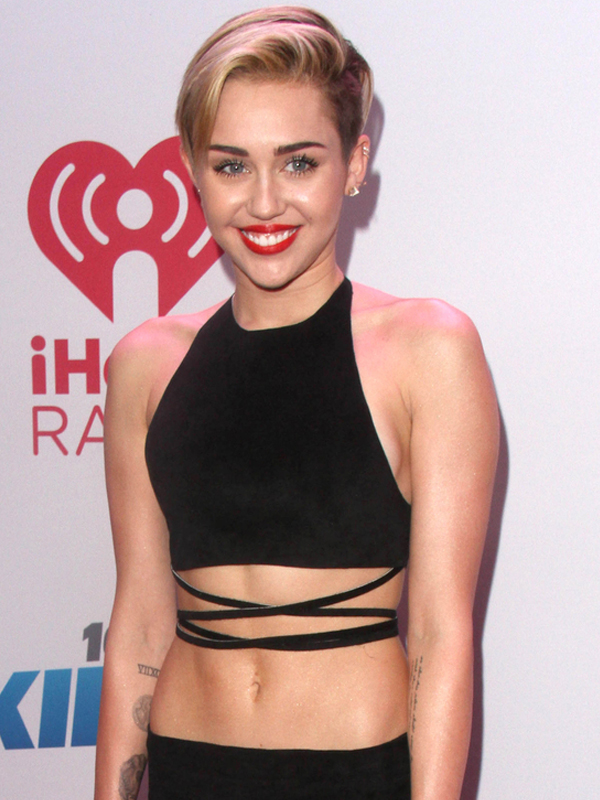Trigger warning: this opinion piece contains discussion about rape culture and sexual assault
Well, 2013 was certainly a year. Yes, we got new Beyonce, Kanye, and Orange is the New Black, but we also got a whole lot of bullsh*t: Rob Ford (nope, get out of here, guy), the GOP's war on women, and the slut-shaming — my GOD, the slut-shaming.
Now, I don't want to tell anyone what to do over the next 365 days, but I hope we got the Miley Cyrus thinkpieces out of our systems because good grief. I mean, I get it: the woman (who is 21, and a consenting adult) made choices not all of us necessarily would, but, in the post-Salt-n-Pepa age of "None Of Your Business," you'd think we'd be beyond looking at someone and declaring them too far gone, or scandalous, or wrong or bad merely because they've embraced their inner exhibitionist.
We'll take the open letter debacle as an example. In response to Miley Cyrus' "Wrecking Ball" video, Sinead O'Connor penned an open letter to the singer, at first telling her she didn't need to take her clothes off for success (true), but then going on to say that Miley's body was "for her husband" only.
OH HELL NO.
Sinead O'Connor may not have been an artist who opted to get naked atop a wrecking ball, but she did choose to rip up a photo of Pope John II on live television when she was in her 20s as a political statement. Yes, it was relevent and a reflection of the social and political climate of Ireland (and Miley Cyrus "Wrecking Ball" wasn't), but both garnered publicity, and both singers were shamed because of their tactics. Therefore, you'd think O'Connor would've had Miley's back, as opposed to inflicting tired stereotypes. (Read: men in the industry are controlling you, and only act sexual for a man you're married to.) Of course, Cyrus' comeback was just as appalling (she made a dig at the singer's bipolar disorder), but the ordeal reflected the obsession with Miley at the time. And why? Because she was 21 and made choices we wouldn't have made.
If you remember, nobody called out Robin Thicke, who, in addition to his rape reference-laden song ("You know you want it"), danced with Miley Cyrus at the VMAs — only to pin the blame on her, claiming he (a 30-something-year-old man) was completely oblivious to her plans to twerk on him. In fact, Thicke's song played loudly and proudly all summer and fall, while Miley's admission that she and her friends popped molly and smoked pot (not rare among teens and 20-somethings) took the world by storm. Again, Miley Cyrus was the bad guy. Again, a young woman suffered at the hands of critics who seemed to have forgotten she was a chart-topping billionaire who'd built an empire for herself, and fixated only on how "out of control" she was, and how barely-clothed she tended to be. (So out of control, I guess, that she delivered flawless performances on SNL and the AMAs — crying cat and all.)
Of course, this wasn't the first time a female artist has been on the receiving end of our vitorol merely because she chose to express her sexuality: Britney Spears was set up only to melt down in the early 2000s, while journalists and critics bullied the likes of her, Jessica Simpson, and Christina Aguilera into revealing the status of their virginities and/or their ideas on sex culture. (Which, honestly, is creepy when you think about how most adults don't discuss that amongst themselves — and these were grown men asking young girls things they had no business asking at all.) This time, it was Miley's flare for nudity, which was seen as a cry for help as opposed to what it probably was: Miley's choice. Unlike artists like Justin Bieber who was caught in a brothel and allegedly painting racist graffiti, Miley Cyrus was nothing but professional in 2013. And at no point did she seem a victim or a pawn, despite being branded with either "oh the poor girl" remarks or a form of slut-shaming.
Miley Cyrus represented more about our present culture in 2013 than we give her credit for: the year saw several sexual assault cases go to trial when drunk, unconscious women were taped being sexually assaulted — only to have their rapists pitied for lost football careers (see: Stuebenville). Well-known artists collaborated with R Kelly whose own sexual assault charages have been mounting since the 1990s (and yet he keeps getting work), while Robin Thicke established himself with a song that completely embodies rape culture. Miley Cyrus, however, sits on a wrecking ball in nothing but Doc Marten's, and she should be ashamed.
I'd like to think this will stop in 2014, but you and I both know we've got miles of bullsh*t to trod through yet. However, that being said, our increasing awareness at the ever-present double standard is helping. Jessica Hopper's piece on R Kelly for the Village Voice has been shared nearly 100,000 times by everyone from music critics to Lena Dunham, and Project Unbreakable saw hundreds women and men holding up quotes spoken by their rapists that parallel Robin Thicke's lyrics. All of this takes courage, and while 2013 saw an insurmountable amount of sexism (to say the least), it also saw courage and strength. It takes guts to speak out, it takes guts to expose double standards, and it takes guts to continue on your own path in an industry that's renowned for destroying it.
Let's hope 2014 sees this courage and ass-kicking continue. We're better than what some of 2013 brought.












